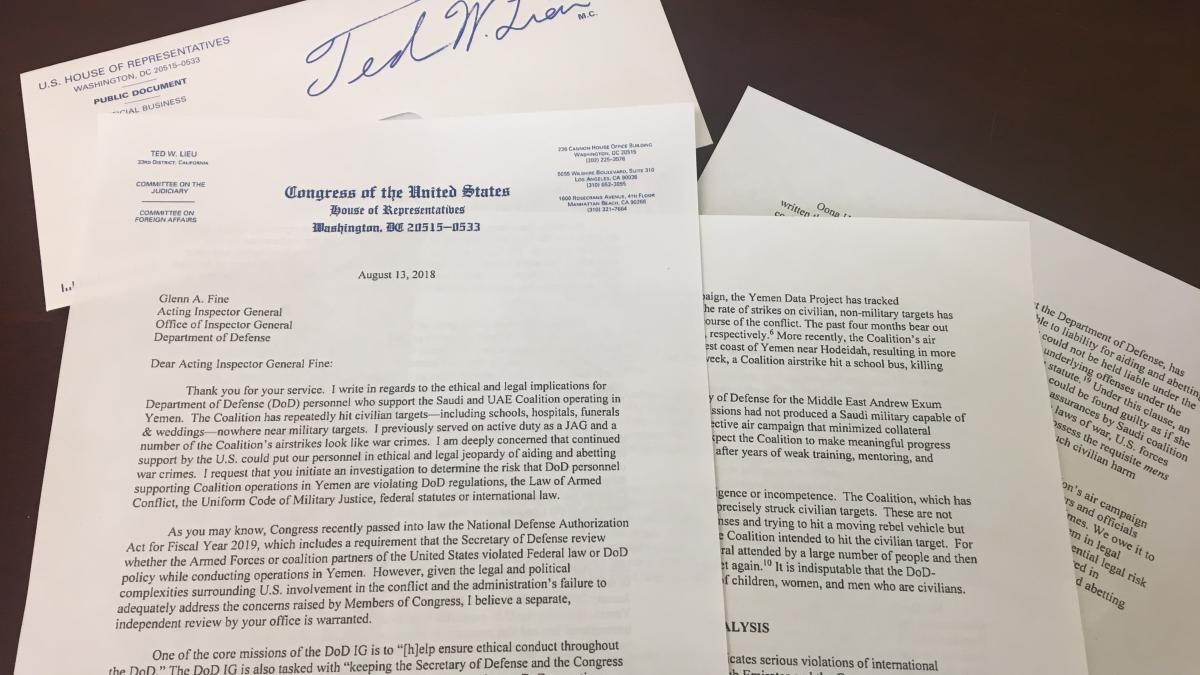REP LIEU CALLS FOR DOD IG INVESTIGATION INTO U.S. ROLE IN CIVILIAN CASUALTIES IN YEMEN

LOS ANGELES – Today, Congressman Ted W. Lieu (D-Los Angeles County) sent a letter to the Department of Defense Inspector General calling for an investigation into whether U.S. personnel supporting Saudi and Emeriti coalition operations in Yemen are violating DoD regulations, the Law of Armed Conflict, the Uniform Code of Military Justice, federal statutes or international law. The letter comes after a Saudi-led airstrike hit a school bus in Yemen last week. Rep. Lieu has long called for more scrutiny into the coalition's actions in Yemen, questioning the U.S.'s efforts to ensure Saudi and Emeriti forces are actively mitigating civilian casualties and avoiding worsening the humanitarian crisis in Yemen.
In the letter, Rep. Lieu writes:
- I write in regards to the ethical and legal implications for Department of Defense (DoD) personnel who support the Saudi and UAE Coalition operating in Yemen. The Coalition has repeatedly hit civilian targets—including schools, hospitals, funerals & weddings—nowhere near military targets. I previously served on active duty as a JAG and a number of the Coalition's airstrikes look like war crimes. I am deeply concerned that continued support by the U.S. could put our personnel in ethical and legal jeopardy of aiding and abetting war crimes.
- As you may know, Congress recently passed into law the National Defense Authorization Act for Fiscal Year 2019, which includes a requirement that the Secretary of Defense review whether the Armed Forces or coalition partners of the United States violated Federal law or DoD policy while conducting operations in Yemen. However, given the legal and political complexities surrounding U.S. involvement in the conflict and the administration's failure to adequately address the concerns raised by Members of Congress, I believe a separate, independent review by your office is warranted.
- If the coalition's targeting of farms, food storage sites, and water sites was deliberate, these airstrikes would constitute a violation of Article 14 of Additional Protocol II and customary international law in non-international armed conflict. International humanitarian law prohibits warring parties from carrying out attacks on objects that are indispensable to the civilian population or from using starvation as a method of warfare. Warring parties must allow and facilitate the rapid passage of humanitarian aid for civilians in need and ensure the freedom of movement of humanitarian workers. The Saudi-led coalition has unnecessarily hindered the delivery of humanitarian aid and the free movement of aid workers, damaged or destroyed objects indispensable to the survival of the civilian population and, in November, closed all entry and exit points to Yemen, immediately and predictably exacerbating existing food shortages in Yemen.
- I am deeply concerned that continued U.S. refueling, operational support functions, and weapons transfers could qualify as aiding and abetting these potential war crimes, placing our own troops and officials in serious legal jeopardy. Under customary international law, responsibility for aiding and abetting can be established on the basis of "knowing that such act had the substantial likelihood of assisting the underlying offense." Ryan Goodman, former Special Counsel at the Department of Defense, has noted that the Department's own regulations and judicial findings from the Guantanamo hearings also support the notion that aiding and abetting war crimes requires only knowledge that support could assist a potential crime—not direct intent on the part of the abettor to achieve the criminal result.
READ THE FULL TEXT OF THE LETTER HERE
Congressman Lieu's previous work on Yemen:
In July 2018, Rep. Lieu and Ted Yoho (R-FL) sent a letter [lieu.house.gov] to Senate and House Armed Services Committee leaders to express support for a National Defense Authorization Act (NDAA) provision that would establish certification requirements for U.S. assistance to Gulf partners operating in Yemen.
In December 2017, President Donald J. Trump signed the 2018 NDAA, which included two provisions on Yemen that Rep. Lieu authored, into law. . Congressman Lieu authored provisions that will bring critical congressional oversight to the conflict in Yemen for the first time. Sec. 1265 requires the Departments of Defense and State to report to Congress on whether the Kingdom of Saudi Arabia and its coalition partners are abiding by their commitments in Yemen. Sec. 1275 requires the President to submit a detailed report that contains a military and diplomatic strategy for Yemen.
In July 2017, the House of Representatives passed Congressman Lieu's amendment to the National Defense Authorization Act for Fiscal Year 2018 that requires the Departments of Defense and State to report to Congress on whether the Kingdom of Saudi Arabia and its coalition partners are abiding by their commitments in Yemen to avoid civilian casualties.
In May 2017, Congressmen Lieu and Ted Yoho (R-FL) called on House Foreign Affairs Committee Chairman Ed Royce to review the proposed sale of precision-guided munitions to Saudi Arabia. Congressman Lieu also introduced legislation to place conditions on all air-to-ground munitions sales to the Kingdom of Saudi Arabia. The three conditions relate to avoiding civilian casualties, facilitating humanitarian aid, and targeting U.S.-designated terrorist organizations such as AQAP and ISIS.
In April 2017, Congressman Lieu led a letter with a bipartisan group of 30 Members of Congress to Secretary of Defense Mattis and Secretary of State Tillerson requesting information related to the operational conduct of the Royal Saudi Air Force in Yemen.
In November 2016, Congressman Lieu led the Lantos Human Rights Commission in holding a hearing on the humanitarian crisis in Yemen. In August 2016, Congressman Lieu led a bipartisan group of 64 Members of Congress in sending a letter to President Barack Obama urging him to postpone the sale of new arms to Saudi Arabia. The letter raised concerns regarding the Saudi-led Coalition's killing of civilians. Previously, Congressman Lieu had repeatedly raised similar concerns, sending letters to the Chairman of the Joint Chiefs of Staff and Secretaries John Kerry and Ash Carter. He also introduced legislation to establish new guidelines for weapons sales to Saudi Arabia.
###